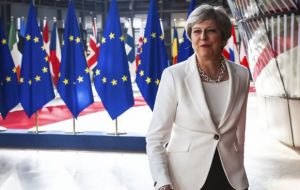MercoPress. South Atlantic News Agency
EU-UK Brexit talks stalled on Ireland; PM May's coalition partners torpedo an understanding
 “We will reconvene before the end of the week and I am also confident that we will conclude this positively,” Ms May said.
“We will reconvene before the end of the week and I am also confident that we will conclude this positively,” Ms May said.  “She is a tough negotiator, and not an easy one,” Juncker said reflecting concern in Brussels that concessions by Ms May could fuel a push to unseat her.
“She is a tough negotiator, and not an easy one,” Juncker said reflecting concern in Brussels that concessions by Ms May could fuel a push to unseat her.  “I am surprised and disappointed that the UK government now appears not to be in a position to conclude what was agreed earlier today,” Irish PM Varadkar said.
“I am surprised and disappointed that the UK government now appears not to be in a position to conclude what was agreed earlier today,” Irish PM Varadkar said. Despite hopes of a major breakthrough on Brexit, talks between the United Kingdom and European Union (EU) have stalled, in large part over discussions about the Irish border. When British Prime Minister Theresa May arrived in Brussels on Monday to meet European Commission President Jean-Claude Juncker, there were indications a major breakthrough on stage one of Brexit was imminent.
If an understanding had been reached, that would have allowed discussions to move on to trade in the near future.
The UK had been reportedly prepared to accept that Northern Ireland and the Republic of Ireland would effectively have the same customs arrangements and rules that apply in the EU single market post-Brexit, meaning there would be no need for new border checks in the once troubled region.
Avoiding a return to a so-called “hard border”, which some fear would disrupt the peace deal in the north, has been a key goal of Brexit negotiators.
But after Northern Ireland's Democratic Unionist Party, which props up the UK Government, held a media conference to publicly oppose the idea of any form of “regulatory divergence” from Britain, talks suddenly broke down, angering the Irish Government.
“I am surprised and disappointed that the British Government now appears not to be in a position to conclude what was agreed earlier today,” Irish Prime Minister Leo Varadkar said.
The pound fell back, losing a cent against the dollar, as Ms May and Mr Juncker emerged from their longer than expected meeting to say there was still not “sufficient progress” on divorce terms to move ahead.
Ms May agreed with Mr Juncker that a deal could be reached in a few days before the EU summit on December 14–15, but that promise did little to stem recriminations at home, where Brexit campaigners want Britain to become what one called a “free agent” and set its own rules.
“We will reconvene before the end of the week and I am also confident that we will conclude this positively,” Ms May said.
Mr Juncker insisted the meeting, after days of intensive talks behind the scenes, was “not a failure” and, well aware the EU does not want to humiliate Ms May as she accepts many of its terms for withdrawal, credited the Prime Minister with hanging tough.
Underlining the conundrums of Brexit, the idea of Northern Ireland remaining closely linked to the EU single market prompted speculation that, to avoid new barriers between Belfast and London, the British mainland would have to follow suit.
The leaders of Scotland and London, which voted against Brexit, demanded they be allowed the same EU relationship as Northern Ireland. Yet Ms May has ruled out such differentiated treatment or staying in a customs union or the single market.
“She is a tough negotiator, and not an easy one,” Mr Juncker said in remarks reflecting concern in Brussels that concessions by Ms May could fuel a disruptive push in London to unseat her.
“She is defending the point of view of Britain with all the energy we know she has.
”Despite our best efforts and the significant progress we and our teams have made over the past days on the remaining issues, it was not possible to reach a complete agreement.“
The sudden announcement that no deal had been reached swiftly squelched optimism that had spread earlier on Monday. Irish Government sources had said agreement had been reached on an overall deal for the Irish issues.
”The key phrase is a clear commitment to maintaining regulatory alignment in relation to the rules of the customs union and internal market which are required to support the Good Friday Agreement, the all-island economy and the border,“ one of the Irish Government sources said.
The Irish border, which is now completely unguarded and barely even marked, would not change its physical appearance after Britain leaves the EU, Irish Foreign Minister Simon Coveney said.
Fears that a ”hard border“ could disrupt the peace deal in the north had driven both sides to find solutions. Mr Juncker spoke to Mr Varadkar by phone.
EU lawmaker Philippe Lamberts, who met Mr Juncker, said the draft text on Ireland committed Britain to ”full alignment” on rules.




Top Comments
Disclaimer & comment rules-

-

-

Read all commentsLet the Unionist’s withdraw their support and let the government fall. After a general election hopefully the UK and Eire will be able to formulate an agreement that is in the best interests of both countries. With an included referendum of whether the UK accepts Ulster as part of the UK. Leaving the Unionists to their proper role of narrow bigots in a provincial back-water.
Dec 06th, 2017 - 01:57 pm 0I would like to see the Republic of Ireland leave the EU then there would be no troubles with Brexit. You will not get the people of Northern Ireland to agree to a union with the Republic as they know which side their bread is buttered.
Dec 06th, 2017 - 07:27 pm 0The majority of voters in NI voted to remain in the EU. A united Ireland would give them that.
Dec 06th, 2017 - 09:21 pm 056% to 44% for staying in the EU was the NI vote folks..... DUP lost their majority in that last GE. Gerry Adams' lot are becoming more and more popular in the province...
Commenting for this story is now closed.
If you have a Facebook account, become a fan and comment on our Facebook Page!